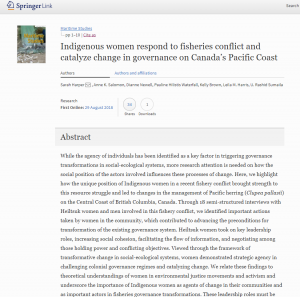
Leila M. Harris is a co-author on a recent article, “Indigenous women respond to fisheries conflict and catalyze change in governance on Canada’s Pacific Coast” by Harper, S., Salomon, A.K., Newell, D., Waterfall, P.H., Brown, K., Harris, L.M., and Sumaila, U.R. published in Maritime Studies.
Abstract: While the agency of individuals has been identified as a key factor in triggering governance transformations in social-ecological systems, more research attention is needed on how the social position of the actors involved influences these processes of change. Here, we highlight how the unique position of Indigenous women in a recent fishery conflict brought strength to this resource struggle and led to changes in the management of Pacific herring (Clupea pallasii) on the Central Coast of British Columbia, Canada. Through 18 semi-structured interviews with Heiltsuk women and men involved in this fishery conflict, we identified important actions taken by women in the community, which contributed to advancing the preconditions for transformation of the existing governance system. Heiltsuk women took on key leadership roles, increasing social cohesion, facilitating the flow of information, and negotiating among those holding power and conflicting objectives. Viewed through the framework of transformative change in social-ecological systems, women demonstrated strategic agency in challenging colonial governance regimes and catalyzing change. We relate these findings to theoretical understandings of women in environmental justice movements and activism and underscore the importance of Indigenous women as agents of change in their communities and as important actors in fisheries governance transformations. These leadership roles must be recognized and supported to navigate towards natural resource sustainability and social justice, globally, as well as reconciliation for past injustices, nationally.
To view full version of the article, click https://link.springer.com/article/10.1007/s40152-018-0101-0